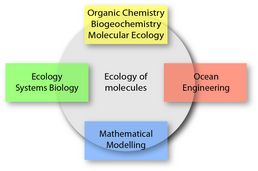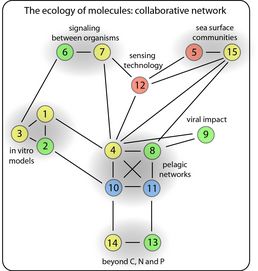Wide range of conventional disciplines
Collaborative Network
Contrary to more conventional schemes, the individual projects are not grouped into separate units but will work together in a collaborative network. Because of shared data sets or jointly performed experiments in the laboratory or at sea, some work packages will work more closely together than others (grey shades area in the figures). To ensure the interdisciplinary character in all subprojects, all PhD students will be advised by a team of three researchers representing at least two of the core disciplines (partially represented by black lines in the figure).
Summary EcoMol
EcoMol - Ecology of Molecules
Life has shaped the environment of our planet ever since it appeared on Earth. For instance, global mean temperature, precipitation pattern and atmospheric oxygen content are controlled by delicate feedback mechanisms in which living organisms play a crucial role. Understanding these processes challenges science and society. Especially in light of the predicted global change over the next several decades and centuries, the need to bridge knowledge gaps in this respect is universally recognized. Ecology investigates interactions among organisms and their environment. The functional properties of a community emerge from these diverse interactions. In the ocean, as in any aquatic environment, interactions between organisms and the associated flow of matter and energy are almost entirely mediated via organic molecules and inorganic constituents in solution. Over the past few years, and largely based on research performed at the Carl von Ossietzky University Oldenburg, it became apparent that seawater contains an extraordinarily diverse mixture of compounds, exceeding probably the genetic diversity of life. This molecular complexity of the non-living environment and the diversity of interactions with organisms that emerge thereof have not yet been considered in any ecological or geochemical study.
With EcoMol we will introduce and advance a new conceptual framework that extends ecological principles to the non-living molecular environment, the “ecology of molecules”. The ecology of molecules understands organic matter as populations of compounds that interact with the community of organisms in a mutual way. This novel scientific framework merges the classical disciplines of ecology and geochemistry. At the Carl von Ossietzky University Oldenburg we have exceptional research capacities in ecology, biodiversity and chemistry of complex natural mixtures. Through the novel collaboration within EcoMol, internationally outstanding capacities will be built in an emerging research area. The interdisciplinary team of EcoMol consists of chemists at the Institute for Chemistry (IfC) and the Institute for Chemistry and Biology of the Marine Environment (ICBM), biologists at the Institute for Biology and Environmental Sciences (IBU) and ICBM, mathematical modelers (ICBM) and engineers at Jade University of Applied Sciences and ICBM.
Bringing the expertise of these disciplines together will offer 15 PhD students the opportunity of studying at the forefront of a developing research field. Furthermore, the participating graduate students will be trained in the multidisciplinary team in state-of-the-art molecular analytical technologies, marine engineering, mathematical approaches and other modern techniques providing them with excellent career opportunities also in the applied sciences and industry. The PhD students will be trained in communicative and interdisciplinary competences and soft skills within the graduate school “Oltech” at the Carl von Ossietzky University Oldenburg. Students will also benefit from extended research visits abroad at partner institutes of the international scientific network of the individual principal investigators.



![[Translate to English:]](/f/5/_processed_/3/2/csm_ICBM-Logo-transparent-_91fe1c6774.png)

